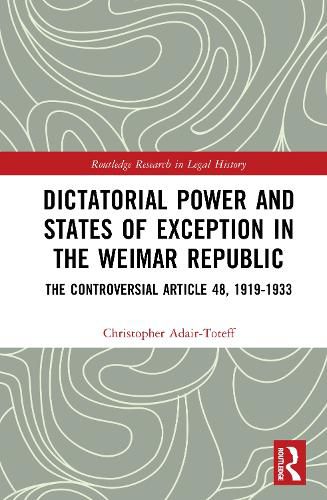Readings Newsletter
Become a Readings Member to make your shopping experience even easier.
Sign in or sign up for free!
You’re not far away from qualifying for FREE standard shipping within Australia
You’ve qualified for FREE standard shipping within Australia
The cart is loading…






This book is an account of the tension between the need for order and the desire for freedom during the tense years of the Weimar Republic. It explains how various groups interpreted Article 48 of the Weimar Constitution and utilized it to reinstate peace and tranquility. While Article 48 is usually associated with the so-called "Preussenschlag"-the taking over of the Prussian government by the order of Reich Chancelor Kurt von Papen-it had been introduced as a necessity during earlier "states of emergency". This investigation delves into the relevant works by many of the leading constitutional scholars in Germany. This list includes Hugo Preuss, Carl Schmitt, Hans Kelsen, Gerhard Anschuetz, Richard Thoma, Erwin Jacobi, Hans Nawiasky, and Richard Grau. This book is a clearly written and detailed account of the history surrounding this debate about the appropriate emergency measures to be taken under Article 48. The work is important for its historical interest, and also because the conflict between authority and freedom has continuing relevance. The book will be a valuable resource for researchers and academics working in the areas of Legal History, Legal Philosophy, Legal Theory, Constitutional History, and German Studies.
$9.00 standard shipping within Australia
FREE standard shipping within Australia for orders over $100.00
Express & International shipping calculated at checkout
This book is an account of the tension between the need for order and the desire for freedom during the tense years of the Weimar Republic. It explains how various groups interpreted Article 48 of the Weimar Constitution and utilized it to reinstate peace and tranquility. While Article 48 is usually associated with the so-called "Preussenschlag"-the taking over of the Prussian government by the order of Reich Chancelor Kurt von Papen-it had been introduced as a necessity during earlier "states of emergency". This investigation delves into the relevant works by many of the leading constitutional scholars in Germany. This list includes Hugo Preuss, Carl Schmitt, Hans Kelsen, Gerhard Anschuetz, Richard Thoma, Erwin Jacobi, Hans Nawiasky, and Richard Grau. This book is a clearly written and detailed account of the history surrounding this debate about the appropriate emergency measures to be taken under Article 48. The work is important for its historical interest, and also because the conflict between authority and freedom has continuing relevance. The book will be a valuable resource for researchers and academics working in the areas of Legal History, Legal Philosophy, Legal Theory, Constitutional History, and German Studies.